- Home
- Jr. Horatio Alger
Try and Trust; Or, Abner Holden's Bound Boy Page 2
Try and Trust; Or, Abner Holden's Bound Boy Read online
Page 2
CHAPTER II
INTRODUCING THE HERO
If my young readers do not find the town of Waverley on the map of Ohio,they may conclude that it was too small to attract the notice of themap-makers. The village is small, consisting of about a dozen houses,a church, a schoolhouse, and, as a matter of course, one of thatwell-known class of stores in which everything required for the familyis sold, from a dress-pattern to a pound of sugar. Outside of thevillage there are farmhouses, surrounded by broad acres, which keep themat respectable distances from each other, like the feudal castles ofthe Middle Ages. The land is good, and the farmers are thrifty andwell-to-do; but probably the whole town contains less than a thousandinhabitants.
In one of the houses, near the church, lived Dr. Kent, whose letter hasalready been referred to. He was a skillful physician, and a very worthyman, who would have been very glad to be benevolent if his limitedpractice had supplied him with the requisite means. But chance haddirected him to a healthy and sparsely-settled neighborhood, where hewas able only to earn a respectable livelihood, and indeed found himselfcompelled to economize at times where he would have liked to indulgehimself in expense.
When Mrs. Mason died it was found that the sale of her furniture barelyrealized enough to defray the expenses of her funeral. Herbert, her onlyson, was left wholly unprovided for. Dr. Kent, knowing that he had arich uncle in New York, undertook to communicate to him the position inwhich his nephew had been left, never doubting that he would cheerfullyextend a helping hand to him. Meanwhile he invited Herbert to come tohis house and make it his home till his uncle should send for him.
Herbert was a handsome, well-grown boy of fourteen, and a generalfavorite in the village. While his mother lived he had done all he couldto lighten her tasks, and he grieved deeply for her loss now that shewas gone. His father had ten years before failed in business in the cityof New York, and, in a fit of depression, had emigrated to this obscurecountry village, where he had invested the few hundred dollars remainingto him in a farm, from which he was able to draw a scanty income.Being a man of liberal education, he had personally superintended theeducation of his son till his death, two years before, so that Herbert'sattainments were considerably in advance of those of other boys of hisage in the neighborhood. He knew something of Latin and French, whichmade him looked upon as quite a model of learning by his playmates.After his father's death he had continued the daily study of thelanguages, so that he was able to read ordinary French with nearly asmuch ease as if it were English. Though studious, he was not a bookworm,but was distinguished in athletic sports popular with boys of his age.
Enough has been said of our hero by way of introduction. Herbert'sfaults and virtues will appear as the record of his adventures iscontinued. It may be hinted only that, while he was frank, manly, andgenerous in his disposition, he was proud and high-spirited also, andperhaps these qualities were sometimes carried to excess. He would notallow himself to be imposed upon if he could help it. Being strong forhis age, he was always able to maintain his rights, but never abused hisstrength by making it the instrument of tyrannizing over weaker boys.
Of course Herbert felt somewhat anxious as to his future prospects. Heknew that the doctor had written to his Uncle Benjamin about him, and hehoped that he might be sent for to New York, having a great curiosity tosee the city, of which he had heard so much.
"Have you heard from my uncle, Dr. Kent?" he inquired, a few days afterthe scene recorded in our first chapter.
His question was prompted by seeing the doctor coming into the yard withan open letter in his hand.
"Yes," said Dr. Kent, with troubled expression and perplexed took.
"What does Uncle Benjamin say?" asked our young hero, eagerly.
"Nothing very encouraging, Herbert, I am sorry to say," returned thedoctor. "However, here is the letter; you may read it for yourself."
Herbert received the letter from the doctor's hands and read it throughwith feelings of mortification and anger.
Here it is:
"DEAR SIR: I have to acknowledge yours of the 10th inst. I regret tohear of my sister's decease. I regret, also, to hear that her son,Herbert, is left without a provision for his support. My brother-in-lawI cannot but consider culpable in neglecting to lay up something duringhis life upon which his widow and son might depend. I suspect that hemust have lived with inconsiderate extravagance.
"As for myself, I have a family of my own to provide for, and theexpense of living in a city like this is very great. In justice to them,I do not feel that it would be right for me to incur extra expense. Youtell me that he is now fourteen and a stout boy. He is able, I shouldthink, to earn his own living. I should recommend that he be bound outto a farmer or mechanic. To defray any little expenses that may arise, Ienclose ten dollars, which I hope he may find serviceable. Yours etc.,
"BENJAMIN STANTON."
This cold and selfish letter Herbert read with rising color, and afeeling of bitterness found a place in his young heart, which was quiteforeign to him.
"Well, Herbert, what do you think of it?" asked the doctor.
"I think," said Herbert, hotly, "that I don't want to have anything todo with an uncle who could write such a letter as that."
"He doesn't seem to write with much feeling." acknowledged the doctor.
"Feeling!" repeated Herbert; "he writes as if I were a beggar, and askedcharity. Where is the money he inclosed, Dr. Kent?"
"I have it here in my vest pocket. I was afraid it would slip out of theletter, and so took care of it."
"Will you let me send it back to my uncle?" asked Herbert.
"Send it back?"
"Yes, Dr. Kent; I don't want any of his charity, and I'll tell him so."
"I am afraid, Herbert, that you are giving way to your pride."
"But isn't it a proper pride, doctor?"
"I hardly know what to say, Herbert. You must remember, however, that,as you are left quite unprovided for, even this small sum may be of useto you."
"It isn't the smallness of the sum that I mind," said Herbert. "If UncleBenjamin had written a kind letter, or showed the least feeling in itfor me, or for--for mother [his voice faltered a moment], I would haveaccepted it thankfully. But I couldn't accept money thrown at me inthat way. He didn't want to give it to me, I am sure, and wouldn't if hehadn't felt obliged to."
Dr. Kent paced the room thoughtfully. He respected Herbert's feelings,but he saw that it was not wise for him to indulge them. He was in adependent situation, and it was to be feared that he would have much tosuffer in time to come from the coldness and selfishness of the world.
"I will tell you what to do, Herbert," he said, after a while. "You canaccept this money as a loan, and repay it when you are able."
"With interest?"
"Yes, with interest, if you prefer it."
"I shall be willing to accept it on those terms," said Herbert; "but Iwant my uncle to understand it."
"You may write to your uncle to that effect, if you like."
"Very well, Dr. Kent. Then I will write to him at once."
"You will find some paper in my desk, Herbert. I suppose you will notobject to my seeing your letter."
"No, doctor, I intended to show it to you. You won't expect me to showmuch gratitude, I hope?"
"I won't insist upon it, Herbert," said the doctor, smiling.
Herbert in about half an hour submitted the following note to thedoctor's inspection. It had cost him considerable thought to determinehow to express himself, but he succeeded at last to his tolerablesatisfaction.
"UNCLE BENJAMIN [so the letter commenced]: Dr. Kent has just shownme your reply to his letter about me. You seem to think I wish you tosupport me, which is not the case. All I should have asked was yourinfluence to help me in obtaining a situation in the city, where Imight support myself. I am willing to work, and shall probably find someopportunity here. The ten dollars, which you inclose, I will accept ASA LOAN, and will repay you as soon as I am able,
WITH INTEREST. HERBERTMASON."
"Will that do?" asked Herbert.
Dr. Kent smiled.
"You were careful not to express any gratitude, Herbert," he said.
"Because I don't feel any," returned Herbert, promptly. "I feel gratefulto you, Dr. Kent, for your great kindness. I wish I could pay you forthat. I shall never forget how you attended my mother in her sickness,when there was small prospect of your being paid."
"My dear boy," said the doctor, resting his hand affectionately onHerbert's shoulder, "I have been able to do but very little. I wish Icould do more. If you wish to repay me, you can do it a hundred timesover by growing up a good and honorable man; one upon whom your motherin heaven can look down with grateful joy, if it is permitted her towatch your progress here."
"I will do my best, doctor," said Herbert.
"The world is all before you," proceeded Dr. Kent. "You may not achievea brilliant destiny. It is permitted to few to do that. But whether yoursphere is wide or narrow, you may exert an influence for good, AND LEAVETHE WORLD BETTER FOR YOUR HAVING LIVED IN IT."
"I hope it may be so," said Herbert, thoughtfully. "When I am tempted todo wrong, I will think of my mother."
"It is the very best thing you can do, Herbert. And now for your plans.I wish I were in a situation to have you remain with me. But as thatcannot be, I will do my best to get you a place."
"I ought to be at work," said Herbert, "as I have my living to get. Iwant you to take that ten dollars, doctor, as part payment of the debt Iowe you."
The doctor shook his head.
"I can't do that, Herbert, not even to oblige you. You were too proudto accept a favor from your uncle. You will not be too proud, I hope, toaccept one from me?"
"No, doctor; I am not too proud for that. You are my friend, and myuncle cares nothing for me."
When Herbert's letter reached New York, his uncle felt a momentaryshame, for he saw that his nephew had rightfully interpreted his ownselfishness and lack of feeling, and he could not help involuntarilyadmiring the independent spirit which would not allow him to acceptthe proffered money, except as a loan. But mingled with his shame was afeeling of relief, as he foresaw that Herbert's pride would not sufferhim to become a burden upon him in the future. He hardly expected everto see the ten dollars returned with interest; but even if he lost it,he felt that he should be getting off cheap.

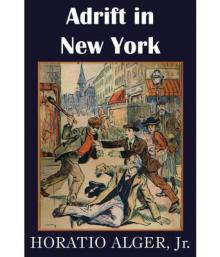 Adrift in New York: Tom and Florence Braving the World
Adrift in New York: Tom and Florence Braving the World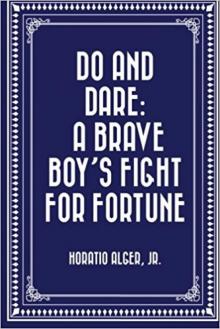 Do and Dare — a Brave Boy's Fight for Fortune
Do and Dare — a Brave Boy's Fight for Fortune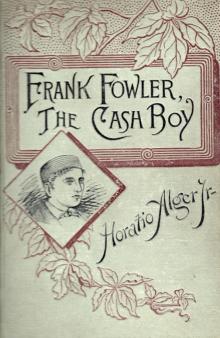 The Cash Boy
The Cash Boy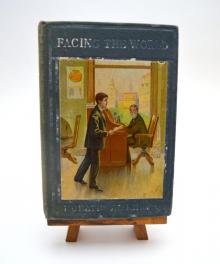 Facing the World
Facing the World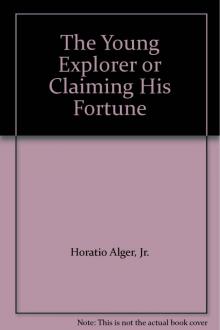 The Young Explorer; Or, Claiming His Fortune
The Young Explorer; Or, Claiming His Fortune The Store Boy
The Store Boy Frank's Campaign; Or, The Farm and the Camp
Frank's Campaign; Or, The Farm and the Camp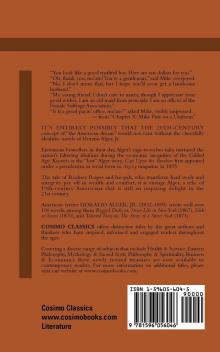 Cast Upon the Breakers
Cast Upon the Breakers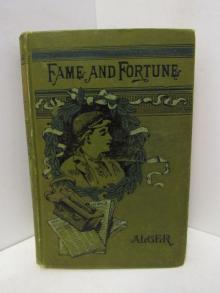 Fame and Fortune; or, The Progress of Richard Hunter
Fame and Fortune; or, The Progress of Richard Hunter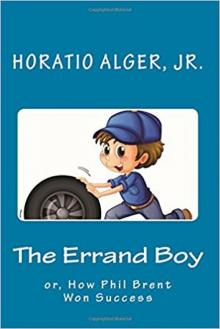 The Errand Boy; Or, How Phil Brent Won Success
The Errand Boy; Or, How Phil Brent Won Success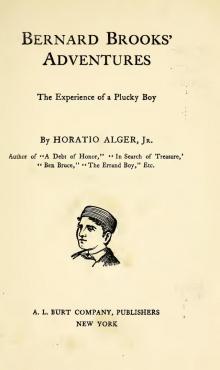 Bernard Brooks' Adventures: The Experience of a Plucky Boy
Bernard Brooks' Adventures: The Experience of a Plucky Boy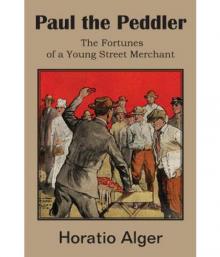 Paul the Peddler; Or, The Fortunes of a Young Street Merchant
Paul the Peddler; Or, The Fortunes of a Young Street Merchant Brave and Bold; Or, The Fortunes of Robert Rushton
Brave and Bold; Or, The Fortunes of Robert Rushton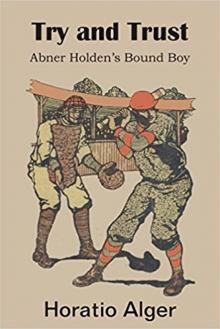 Try and Trust; Or, Abner Holden's Bound Boy
Try and Trust; Or, Abner Holden's Bound Boy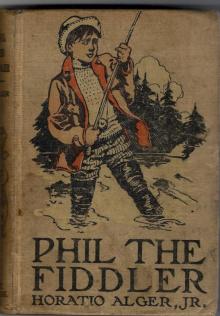 Phil, the Fiddler
Phil, the Fiddler In A New World; or, Among The Gold Fields Of Australia
In A New World; or, Among The Gold Fields Of Australia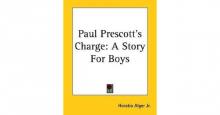 Paul Prescott's Charge
Paul Prescott's Charge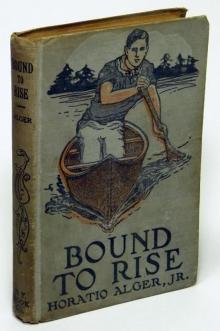 Joe's Luck; Or, Always Wide Awake
Joe's Luck; Or, Always Wide Awake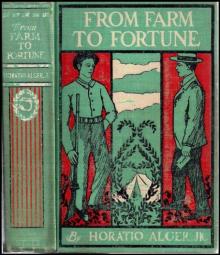 From Farm to Fortune; or, Nat Nason's Strange Experience
From Farm to Fortune; or, Nat Nason's Strange Experience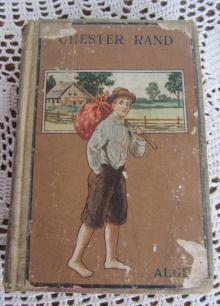 Chester Rand; or, The New Path to Fortune
Chester Rand; or, The New Path to Fortune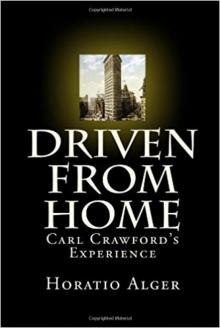 Driven from Home; Or, Carl Crawford's Experience
Driven from Home; Or, Carl Crawford's Experience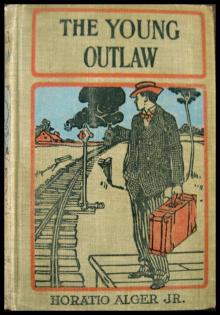 The Young Outlaw; or, Adrift in the Streets
The Young Outlaw; or, Adrift in the Streets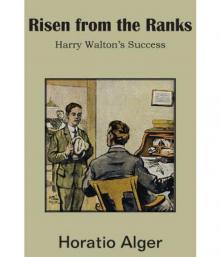 Risen from the Ranks; Or, Harry Walton's Success
Risen from the Ranks; Or, Harry Walton's Success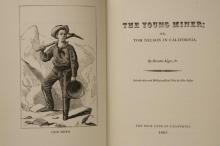 The Young Miner; Or, Tom Nelson in California
The Young Miner; Or, Tom Nelson in California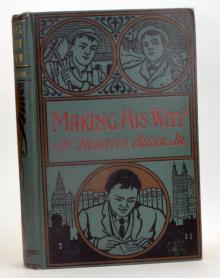 Making His Way; Or, Frank Courtney's Struggle Upward
Making His Way; Or, Frank Courtney's Struggle Upward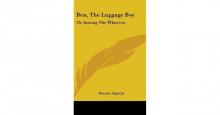 Ben, the Luggage Boy; Or, Among the Wharves
Ben, the Luggage Boy; Or, Among the Wharves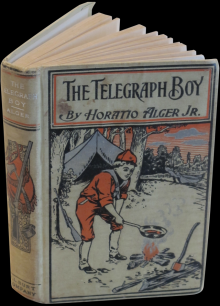 The Telegraph Boy
The Telegraph Boy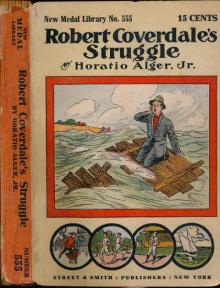 Robert Coverdale's Struggle; Or, on the Wave of Success
Robert Coverdale's Struggle; Or, on the Wave of Success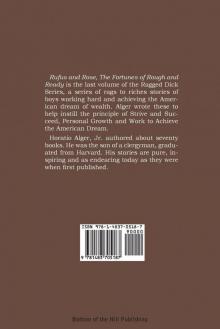 Rufus and Rose; Or, The Fortunes of Rough and Ready
Rufus and Rose; Or, The Fortunes of Rough and Ready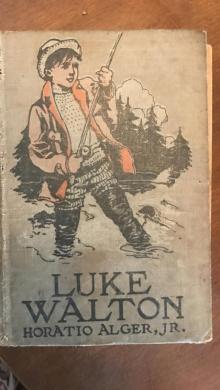 Luke Walton
Luke Walton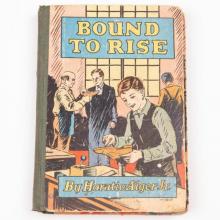 Mark Mason's Victory: The Trials and Triumphs of a Telegraph Boy
Mark Mason's Victory: The Trials and Triumphs of a Telegraph Boy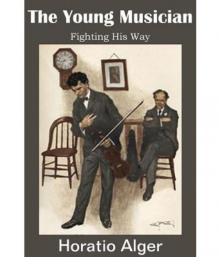 The Young Musician; Or, Fighting His Way
The Young Musician; Or, Fighting His Way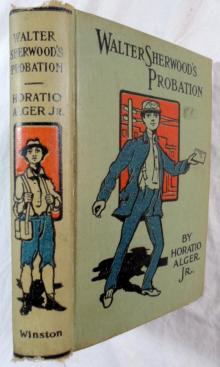 Walter Sherwood's Probation
Walter Sherwood's Probation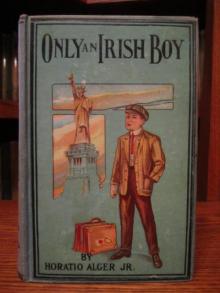 Only an Irish Boy; Or, Andy Burke's Fortunes
Only an Irish Boy; Or, Andy Burke's Fortunes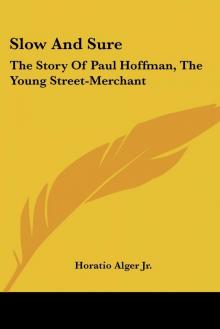 Slow and Sure: The Story of Paul Hoffman the Young Street-Merchant
Slow and Sure: The Story of Paul Hoffman the Young Street-Merchant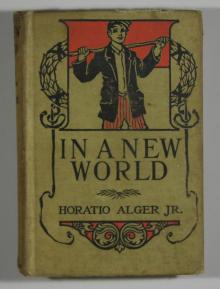 Herbert Carter's Legacy; Or, the Inventor's Son
Herbert Carter's Legacy; Or, the Inventor's Son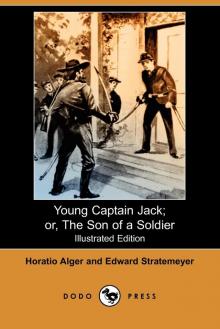 Young Captain Jack; Or, The Son of a Soldier
Young Captain Jack; Or, The Son of a Soldier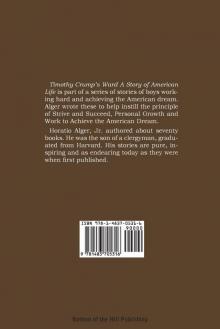 Timothy Crump's Ward: A Story of American Life
Timothy Crump's Ward: A Story of American Life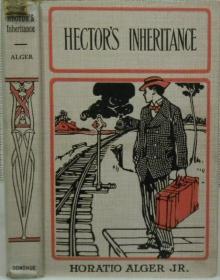 Hector's Inheritance, Or, the Boys of Smith Institute
Hector's Inheritance, Or, the Boys of Smith Institute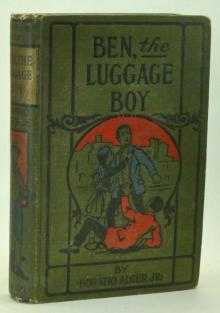 Ben's Nugget; Or, A Boy's Search For Fortune
Ben's Nugget; Or, A Boy's Search For Fortune